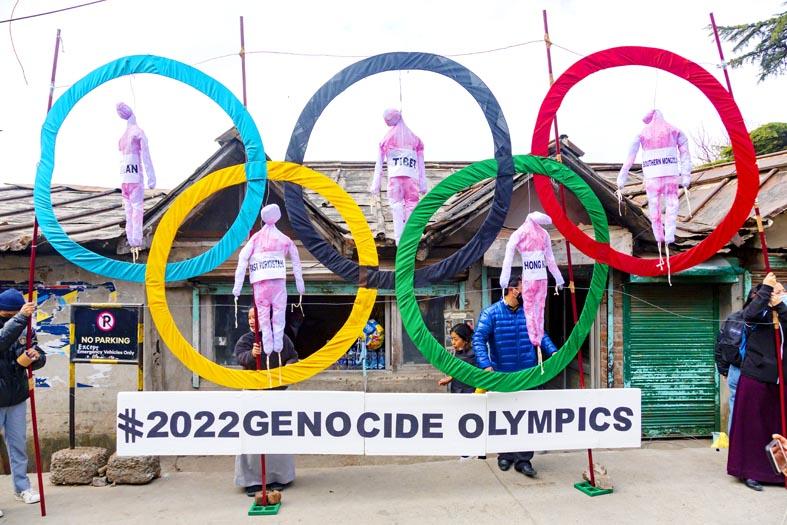Independence advocates yesterday urged lawmakers to follow the European Parliament’s example and hold a vote on boycotting next year’s Beijing Winter Olympics.
“We demand that lawmakers deliberate this matter, take a public stance and pass a resolution, like what the European Parliament did. The Taiwanese legislature should declare to the world and explain why it should not participate [in the Games] hosted by China,” Taiwan Republic Office director-general Chilly Chen (陳峻涵) said.
The European Parliament on July 8 passed a non-binding resolution urging EU members to boycott the next Winter Olympics due to the human rights violations and atrocities committed by Beijing against Uighurs, Tibetans and Hong Kongers, he said.

Photo: AP
The resolution was passed by an overwhelming majority of 578 votes, while 29 opposed it and 73 abstained, he added.
However, the government and legislators have stayed silent on this matter, Chen said.
“It is time to show solidarity with Uighurs, Tibetans and other minorities who have suffered under Chinese oppression with its genocidal policy to eliminate their religion and culture,” he said.
“Taiwan is on the front line of an alliance of democratic nations to confront Chinese aggression... So we must not be ambivalent in our dealings with China, but must make a clear decision and declare publicly why Taiwan should boycott the Beijing Winter Olympics,” Chen said.
Taiwan Republic founder Peter Wang (王獻極) said that it has been more than one month since the European Parliament approved the resolution, “but here in our own legislature, we have heard only silence, as no lawmaker is willing to take a stand on the issue.”
“It is also important for our athletes to compete in Olympic Games under the name Taiwan. Other countries have been calling our Olympic delegation Taiwan. We received much support from the international community in Tokyo,” Wang said.
Wang added that he would lead a group of independence campaigners to visit the offices of legislative caucuses to find out if they would support a vote on boycotting the Games.
A declaration to boycott the Games would not hurt Taiwanese athletes if they choose to compete, as there are ways to go around it, as the Tokyo Olympics had shown, with a team of refugees participating and Russian athletes taking part under the name the Russian Olympic Committee (ROC), Chen said.
“Russians competing as the ROC means this name is already taken, and that the name ROC — or the Republic of China — has no legitimacy in the world,” he said.
“Now is the time to rectify our name and allow our Olympians to compete under the name Taiwan, instead of using the name the ROC or Chinese Taipei,” he added.
Chinese state media will likely portray Taiwanese athletes as coming from “a province of China” or “Taiwan, China,” or use them for propaganda as athletes “coming home to the Chinese motherland’s embrace,” Chen said.
Given China’s control over the media, news and information, and their lack of transparency, the outside world would not really know, he said.
The COVID-19 pandemic might also extend into next year and athletes going to Beijing in February could be at a high risk of infection, he added.

An essay competition jointly organized by a local writing society and a publisher affiliated with the Chinese Communist Party (CCP) might have contravened the Act Governing Relations Between the People of the Taiwan Area and the Mainland Area (臺灣地區與大陸地區人民關係條例), the Mainland Affairs Council (MAC) said on Thursday. “In this case, the partner organization is clearly an agency under the CCP’s Fujian Provincial Committee,” MAC Deputy Minister and spokesperson Liang Wen-chieh (梁文傑) said at a news briefing in Taipei. “It also involves bringing Taiwanese students to China with all-expenses-paid arrangements to attend award ceremonies and camps,” Liang said. Those two “characteristics” are typically sufficient

A magnitude 5.9 earthquake that struck about 33km off the coast of Hualien City was the "main shock" in a series of quakes in the area, with aftershocks expected over the next three days, the Central Weather Administration (CWA) said yesterday. Prior to the magnitude 5.9 quake shaking most of Taiwan at 6:53pm yesterday, six other earthquakes stronger than a magnitude of 4, starting with a magnitude 5.5 quake at 6:09pm, occurred in the area. CWA Seismological Center Director Wu Chien-fu (吳健富) confirmed that the quakes were all part of the same series and that the magnitude 5.5 temblor was

The brilliant blue waters, thick foliage and bucolic atmosphere on this seemingly idyllic archipelago deep in the Pacific Ocean belie the key role it now plays in a titanic geopolitical struggle. Palau is again on the front line as China, and the US and its allies prepare their forces in an intensifying contest for control over the Asia-Pacific region. The democratic nation of just 17,000 people hosts US-controlled airstrips and soon-to-be-completed radar installations that the US military describes as “critical” to monitoring vast swathes of water and airspace. It is also a key piece of the second island chain, a string of

The Central Weather Administration has issued a heat alert for southeastern Taiwan, warning of temperatures as high as 36°C today, while alerting some coastal areas of strong winds later in the day. Kaohsiung’s Neimen District (內門) and Pingtung County’s Neipu Township (內埔) are under an orange heat alert, which warns of temperatures as high as 36°C for three consecutive days, the CWA said, citing southwest winds. The heat would also extend to Tainan’s Nansi (楠西) and Yujing (玉井) districts, as well as Pingtung’s Gaoshu (高樹), Yanpu (鹽埔) and Majia (瑪家) townships, it said, forecasting highs of up to 36°C in those areas